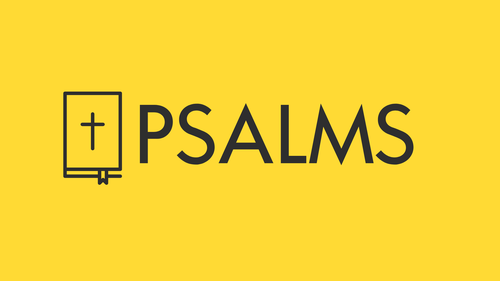Psalm 1

Today’s Passage: Psalm 1
Famed baseball manager, and coach, Yogi Berra, was often better known for his misspoken proverbs than anything he accomplished on the field. One such “Yogi-ism” offered the sage advice, “When you come to a fork in the road, take it.”
Today’s passage offers a fork in the road, showing clearly where each path leads. Psalm 1 is the “gateway psalm.” It implies the question that we should ask ourselves when studying every psalm, “Which path will I take?”
The first leads to one who is blessed. This is not #Blessed, like what blasted social media for a time. That “blessing” aimed at friends, food, and fun is simply aiming too small. The blessed person in the Psalms is one who lives untarnished, secure, and prosperous in every step of life and into eternity. That kind of blessing is to experience peace and joy in a way that cannot be tasted apart from calling out to the One who Created us to long for such goodness and satisfaction.
So how do we get there? The Psalmist begins telling us how not to get there—not in the counsel of the wicked, nor stands in the way of sinners, nor sits in the seat of scoffers. A person wins or loses by who is around them. Surround yourself with losers, and you won’t fare much better. As one speaker famously said, “Show me your friends and I’ll show you your future.”
The other path, the path of the wicked, leads to destruction. They are like chaff [unusable and unwanted part of grain production] that the wind drives away. Therefore the wicked will not stand in the judgment, nor sinners in the congregation of the righteous. Basically, if you want a meaningless life that ends in condemnation, surround yourself with wicked, sinners, and scoffers—people who mock the Lord and his promises. These people may not be “bad” according to our standards, but they aren’t “righteous” according to God’s standard.
The way of the righteous is exactly the opposite. First, notice the heart—his delight is in the law of the Lord. Second, notice his focus—on his law he meditates day and night. Third, notice the result— He is like a tree planted by streams of water that yields its fruit in its season, and its leaf does not wither. In all that he does, he prospers.
At the end of both paths, the Lord knows the way of the righteous, but the way of the wicked will perish. Obviously, the Lord “knows” both “ways.” That must mean the word “know” means more than factual knowledge. It carries the idea of choosing and caring based on a special personal relationship. “The Lord knows those who are his” (2 Timothy 2:19). “I know my own…As the Father knows me and I know the Father (John 10:14–15).
For you and I, it’s this relational “knowing” that is found through a relationship with God through Jesus Christ. When we understand our sin and that our pathway leads to destruction, God offers us another way. We can call out to him for salvation (Romans 10:9–10, 13). We can surrender to our Savior, knowing there is no hope apart from him.
Questions:
How does the godly life resemble the tree described in this psalm?
How has the world influenced your thoughts, practices, or values?
What would change if those areas were more influenced by God’s Word?
Written By: Tyler Short
Famed baseball manager, and coach, Yogi Berra, was often better known for his misspoken proverbs than anything he accomplished on the field. One such “Yogi-ism” offered the sage advice, “When you come to a fork in the road, take it.”
Today’s passage offers a fork in the road, showing clearly where each path leads. Psalm 1 is the “gateway psalm.” It implies the question that we should ask ourselves when studying every psalm, “Which path will I take?”
The first leads to one who is blessed. This is not #Blessed, like what blasted social media for a time. That “blessing” aimed at friends, food, and fun is simply aiming too small. The blessed person in the Psalms is one who lives untarnished, secure, and prosperous in every step of life and into eternity. That kind of blessing is to experience peace and joy in a way that cannot be tasted apart from calling out to the One who Created us to long for such goodness and satisfaction.
So how do we get there? The Psalmist begins telling us how not to get there—not in the counsel of the wicked, nor stands in the way of sinners, nor sits in the seat of scoffers. A person wins or loses by who is around them. Surround yourself with losers, and you won’t fare much better. As one speaker famously said, “Show me your friends and I’ll show you your future.”
The other path, the path of the wicked, leads to destruction. They are like chaff [unusable and unwanted part of grain production] that the wind drives away. Therefore the wicked will not stand in the judgment, nor sinners in the congregation of the righteous. Basically, if you want a meaningless life that ends in condemnation, surround yourself with wicked, sinners, and scoffers—people who mock the Lord and his promises. These people may not be “bad” according to our standards, but they aren’t “righteous” according to God’s standard.
The way of the righteous is exactly the opposite. First, notice the heart—his delight is in the law of the Lord. Second, notice his focus—on his law he meditates day and night. Third, notice the result— He is like a tree planted by streams of water that yields its fruit in its season, and its leaf does not wither. In all that he does, he prospers.
At the end of both paths, the Lord knows the way of the righteous, but the way of the wicked will perish. Obviously, the Lord “knows” both “ways.” That must mean the word “know” means more than factual knowledge. It carries the idea of choosing and caring based on a special personal relationship. “The Lord knows those who are his” (2 Timothy 2:19). “I know my own…As the Father knows me and I know the Father (John 10:14–15).
For you and I, it’s this relational “knowing” that is found through a relationship with God through Jesus Christ. When we understand our sin and that our pathway leads to destruction, God offers us another way. We can call out to him for salvation (Romans 10:9–10, 13). We can surrender to our Savior, knowing there is no hope apart from him.
Questions:
How does the godly life resemble the tree described in this psalm?
How has the world influenced your thoughts, practices, or values?
What would change if those areas were more influenced by God’s Word?
Written By: Tyler Short


1 Comment
Like the Word says in James 1:22-25, we must be constantly regarding Scripture (as a reflection of our image in a mirror) and living what it says, using it as a contrast to what we see and experience in the world. It alone is truth and our only model of righteousness.